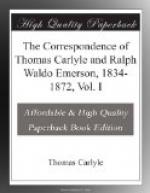I shall send you an Oration presently, delivered before a literary society here, which is now being printed.* Gladly I hear of the Carlylet—so they say—in the new Westminster.
--------- * This was Emerson’s famous Oration before the Phi Beta Kappa Society, at Cambridge, August 31, 1837, on “The American Scholar.” In his admirable essay on Thoreau,—an essay which might serve as introduction and comment to the letters of Carlyle and Emerson during these years,—Lowell speaks of the impression made by this remarkable discourse. It “was an event without any former parallel in our literary annals, a scene to be always treasured in the memory for its picturesqueness and its inspiration. What crowded and breathless aisles, what windows clustering with eager heads, what enthusiasm of approval, what grim silence of foregone dissent! It was our Yankee version of a lecture by Abelard, our Harvard parallel to the last public appearances of Schelling.”—My Study Windows, p. 197 ---------
XVIII. Emerson to Carlyle
Concord, 2 November, 1837
My Dear Friend,—Mr. Charles Sumner, a lawyer of high standing for his age, and editor or one editor of a journal called The Jurist, and withal a lover of your writings, tells me he is going to Paris and thence to London, and sets out in a few days. I cannot, of course, resist his request for a letter to you, nor let pass the occasion of a greeting. Health, Joy, and Peace be with you! I hope you sit still yet, and do not hastily meditate new labors. Phidias need not be always tinkering. Sit still like an Egyptian. Somebody told me the other day that your friends here might have made a sum for the author by publishing Sartor themselves, instead of leaving it with a bookseller. Instantly I wondered why I had never such a thought before, and went straight to Boston, and have made a bargain with a bookseller to print the French Revolution. It is to be printed in two volumes of the size of our American Sartor, one thousand copies, the estimate making the cost of the book say (in dollars and cents) $1.18 a copy, and the price $2.50. The bookseller contracts with me to sell the book at a commission of twenty percent on that selling price, allowing me however to take at cost as many copies as I can find subscribers for. There is yet, I believe, no other copy in the country than mine: so I gave him the first volume, and the printing is begun. I shall take care that your friends here shall know my contract with the bookseller, and so shall give me their names. Then, if so good a book can have a tolerable sale, (almost contrary to the nature of a good book, I know,) I shall sustain with great glee the new relation of being your banker and attorney. They have had the wit in the London Examiner, I find, to praise at last; and I mean that our public shall have the entire benefit of that page. The Westminster they can read themselves. The printers think they can get the book out by Christmas. So it must be long before I can tell you what cheer. Meantime do you tell me, I entreat you, what speed it has had at home. The best, I hope, with the wise and good withal.




